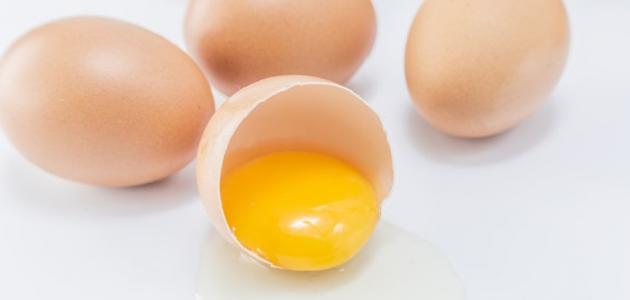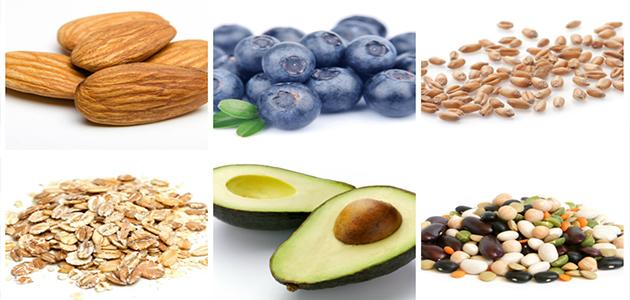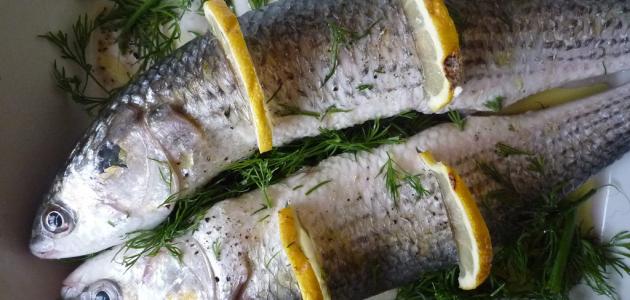Contents
eggs
An egg has 3 main parts. The shell, egg white or albumin, and egg yolk, are formed in the reproductive system of the adult hen, which is made up of the ovary and the oviduct, and all parts of the egg are formed in the oviduct except for the yolk; As it is formed in the follicular sac , through the continued deposition of the substance that makes up the yolk, 99% of this substance is formed 7-9 days before the egg is laid, while the crust is formed in the uterus located in the oviduct within about 20 hours. [1]
Benefits of egg yolk
The food ingredients for egg yolk
Water makes up 48% of the egg yolk, and protein makes up 17.5% of the yolk, while fats make up 32.6% of it, in addition to some minerals and vitamins. The following is a breakdown of the egg yolk contents: [1] [2]
- Protein: Most of the protein in the egg, with its various types, is concentrated in the egg white, and it is also found in the yolk in smaller quantities, while the remainder is found in the eggshell, and these proteins are characterized by having a high digestible coefficient . This parameter indicates the digestibility of protein, and it forms 100% in yolk and 97% in white.
- Carbohydrates: An egg contains a very small amount of carbohydrates, which constitute half a gram on average, and 40% of them are found in the egg yolk, and these carbohydrates are made of oligosaccharides associated with protein, in addition to glucose .
- Minerals: where minerals make up 2% of egg yolks, and phosphorus makes up the largest proportion of them.
- Fats: The yolk contains most or all of the fat in the egg, making up three quarters of the calories, and the fats are divided into several forms. Such as triglycerides, which make up 65%, phospholipids by 29%, cholesterol 5%, and free fatty acids make up 1% of the fat in the yolk.
- It should be noted that yolk is a source of saturated fat, and experts advise that the consumption of these fats should not exceed more than 10% of the total calories consumed daily. Or the equivalent of 22 grams of saturated fat, depending on a diet that contains 2000 calories per day, and one egg yolk provides 7% of the total number of daily calories. One egg yolk also contains 185 milligrams of cholesterol , which is more than 60% of the daily requirement for cholesterol, which makes up 300 mg. [3]
- Choline: Choline is found naturally in many food sources, and egg yolks are one of the best sources, as a large egg weighing 17 grams contains 139 milligrams of choline, equivalent to 25% of the daily requirement of a pregnant woman, and 50% or more The needs of children from 4-8 years old. [4] [5]
- Lutein: Egg yolk contains compounds important for maintaining eye health, such as: lutein and zeaxanthin , which help reduce the risk of developing cataracts and macular degeneration, which is considered One of the most important eye problems that leads to blindness at the age of 55 years and over. [6]
Studies on the benefits of egg yolk
A whole egg is a food that contains protein, fat, and calories in adequate amounts, and causes a feeling of fullness when eaten, and there are many potential health benefits of egg yolk, and a review of several studies has indicated it, published in the journal Nutrients in 2019, and what follows: Some of them are mentioned: [7] [8]
- Egg yolk contains antioxidants such as phosvitin. Which may help reduce pro-inflammatory cytokine, and therefore it is believed that adding egg yolk to the diet can reduce oxidative stress in the intestine.
- Egg yolk can contribute to enhancing immune activity; Whereas, the proteolysis of the egg yolk membrane and other parts of it produces sulfated glycopeptides; Which can stimulate the activity of macrophage cells, which are responsible for boosting immune activity.
- Egg yolk contains peptides that have been shown to reduce blood pressure in mice suffering from high blood pressure , which can help reduce the risk of cardiovascular disease, but it should be noted that egg white may contain a high percentage of phosphorous and sodium. 100 grams of whole eggs contain 198 grams of phosphorous and 142 grams of sodium. [9] In addition, the diet to stop high blood pressure, or what is known as the DASH diet, recommends that you eat no more than 4 eggs. In the week. [10]
The nutritional value of egg yolk
The following table shows the nutritional value of the yolk of a large egg, or the equivalent of 17 grams of yolk: [4]
| The food component | Nutritional value |
|---|---|
| water | 8.89 milliliters |
| Calories | 54.7 Calories |
| Protein | 2.7 grams |
| Total fats | 4.51 grams |
| Carbohydrates | 0.61 g |
| Calcium | 21.9 milligrams |
| Cholesterol | 184 milligrams |
| Iron | 0.464 milligram |
| magnesium | 0.85 milligram |
| Phosphorous | 66.3 milligrams |
| Potassium | 18.5 milligrams |
| Sodium | 8.16 milligrams |
| Selenium | 9.52 micrograms |
| Folate | 24.8 micrograms |
| Choline | 139 milligrams |
| Vitamin B12 | 0.332 mcg |
| Vitamin A | 245 IU |
| Vitamin E. | 0.439 milligram |
| Vitamin D | 0.918 mcg |
| Vitamin K. | 0.017 mcg |
Difference in yolk colors
There is a difference in the colors of the yolk between the different types of eggs, and the type of the species has nothing to do with that, or whether it is fresh or not, but rather depends on the food of the chicken, and the nutritional value of eggs is also affected by the diet of the chicken, as is the case in the case of subsidized eggs, as some substances are high in them. Nutritional food from chicken food, such as: Vitamin D, or Omega-3 , and in what follows is a breakdown of the different colors: [11] [12]
- Yellow-orange color: The colors of the egg yolk vary depending on the food of the chicken, especially the amount of carotenoids in their food, and the yellow-orange color is produced because of these carotenoids, and there are rich sources in it that can be added to chicken food, such as: velvet flower or Calendula and red pepper , this dye has been linked to increased brain and eye health.
- Dark yellow-orange color: which is produced when foods containing xanthophylls are added; Such as green plants, yellow corn, and alfalfa.
- Dull yellow and colorless yolk: a diet containing wheat or barley produces this dull yellow color, while a diet containing white cornmeal produces an almost colorless yolk.
Some colors that may appear in the egg
- The presence of a green ring around the yolk: a green ring may appear around the yolk when it is cooked for a long time, or when the boiling water contains a high amount of iron, which causes an interaction between sulfur and iron and leads to the appearance of this color, and although this color is not desirable, It does not affect the nutritional value, or the taste of the egg, and to avoid this matter it is best to cook eggs at a suitable temperature and time, or cool the cooked eggs quickly. [13]
- The presence of a drop of blood in the yolk : There are rare cases in which the yolk may contain a drop of blood, as the hen's ovary is full of small blood vessels, and it is possible that one of them is torn during the egg-laying cycle, and when the blood spot is Directly related to the yolk, the rupture often occurred during the egg's transition from the follicular sac to the ovary, and it is worth noting that the presence of blood spots does not affect the nutritional value of the eggs, nor does it indicate the presence of bacteria associated with the color change. [14] [15]
The relationship of egg yolk to heart disease
It has been believed for many years that eggs may increase the risk of heart disease , because they contain high cholesterol, and the American Heart Association has recommended in addition to many international health organizations to limit the consumption of food sources high in cholesterol, which led to a decrease in egg consumption in All over the world, eating cholesterol-free egg alternatives instead, but in fact it was found that cholesterol is found naturally in some foods, in addition to that it is made inside the body, but the quantities produced by the liver are less if it is consumed from food, and thus Eating small amounts of eggs does not cause an increase in cholesterol levels. [16] [17] There are mixed results among studies on the effect of eating egg yolk on blood cholesterol levels, and its relationship to heart disease, including the following:
- The relationship of egg yolk to the risk of heart disease: A study published in the Circulation journal in 2008 indicated that eating eggs not continuously is not associated with a higher risk of heart failure , and that eating one egg a day is considered safe, but consumption More than that on a daily basis may increase the risk of developing this disease. [18] [19]
- The relationship of egg yolk to the risk of heart disease in diabetics: A study published in the American Journal of Clinical Nutrition in 2015 on type 2 diabetics indicated that eating two eggs per day for 6 days every week for a period of 3 months, did not affect the level of Fats in the blood. [20]
The nutritional value of whole eggs
The following table shows the nutritional value of one large egg weighing 50 grams: [21]
| The food component | Nutritional value |
|---|---|
| water | 38.1 milliliters |
| Calories | 71.5 calories |
| Protein | 6.28 grams |
| Fats | 4.76 grams |
| Carbohydrates | 0.36 g |
| Calcium | 28 milligrams |
| Iron | 0.875 milligrams |
| magnesium | 6 milligrams |
| Phosphorous | 99 milligrams |
| Potassium | 69 milligrams |
| Sodium | 71 milligrams |
| Selenium | 15.4 micrograms |
| Folate | 23.5 micrograms |
| Choline | 147 milligrams |
| Vitamin B12 | 0.445 mcg |
| Vitamin A | 80 micrograms |
| Vitamin E. | 0.525 milligrams |
| Vitamin D | 1 mcg |
| Vitamin K. | 0.15 mcg |
| Cholesterol | 186 milligrams |
To read about the general benefits of eating whole eggs, you can refer to the article on the benefits of boiled eggs .
References
- ^ A b "The Eggs And Its Chemical Composition" , Www.uoqasim.edu.iq , Retrieved 21-1-2020. Edited.
- ↑ Marc Anton, Yves Nys and Françoise Nau (26-5-2005), “Bioactive egg components and their potential uses , ” www.cabi.org , Retrieved 1-21-2020. Edited.
- ↑ Melodie Anne, "Nutritional Value of an Egg Yolk & White" , www.livestrong.com , Retrieved 1-21-2020. Edited.
- ^ A b " the Egg, Yolk, the raw, Fresh" , Www.fdc.nal.usda.gov , Retrieved 08-01-2020. Edited.
- ↑ George Citroner (30-8-2019), "The Key Nutrient You Probably Don't Get Enough Of" , www.healthline.com , Retrieved 1-21-2020. Edited.
- ↑ "Are eggs good for you or not?" , www.heart.org , (16-8-2018), Retrieved 21-1-2020. Edited.
- ↑ Jennifer Huizen (1-11-2019), "All you need to know about egg yolk" , www.medicalnewstoday.com , Retrieved 1-21-2020. Edited.
- ↑ Sophie Godbert, Nicolas Guyot and Yves Nys (22-3-2019), “The Golden Egg: Nutritional Value, Bioactivities, and Emerging Benefits for Human Health” , Nutrients , Issue 3, Folder 11, Page 684. Edited.
- ↑ "Egg, whole, raw, fresh" , www.fdc.nal.usda.gov , 4-1-2019, Retrieved 22-3-2020. Edited.
- ↑ "Blood pressure: What's food got to do with it?" , www.health.harvard.edu , Retrieved 16-4-2020. Edited.
- ↑ "DOES EGG YOLK COLOR IMPACT NUTRITION QUALITY?" , www.eggnutritioncenter.org , ( 31-5-2018 ), Retrieved 21-1-2020. Edited.
- ↑ "Why Are Some Egg Yolks and Eggshells Different Colors?" , www.foodandnutrition.org , 29-4-2013, Retrieved 21-1-2020. Edited.
- ↑ "Basic Egg Facts" , www.afs.ca.uky.edu , Retrieved 21-1-2020. Edited.
- ↑ Jillian Kubala (4-2-2019), "Are Eggs With Blood Spots Safe to Eat?" , Www.healthline.com , Retrieved 21-1-2020. Edited.
- ↑ Tara Kimball, "Can You Eat Eggs With Blood Spots in Them?" , Www.livestrong.com , Retrieved 21-1-2020. Edited.
- ↑ Franziska Spritzler (12-7-2016), "Are Whole Eggs and Egg Yolks Bad For You, or Good?" , Www.healthline.com , Retrieved 21-1-2020. Edited.
- ↑ Kris Gunnars (8-23-2018), "Eggs and Cholesterol - How Many Eggs Can You Safely Eat?" , Www.healthline.com , Retrieved 21-1-2020. Edited.
- ↑ "Eggs" , www.hsph.harvard.edu , Retrieved 1-21-2020. Edited.
- ↑ Luc Djoussé And Michael Gaziano (1-2008), " the Egg Consumption And Risk Of Heart View the Failure In The Physicians' Health Study" , Circulation , Issue 4, 117 the Folder, . Page 512. Edited by .
- ↑ Nicholas Fuller, Ian Caterson, Amanda Sainsbury and others (4-2015), “The effect of a high-egg diet on cardiovascular risk factors in people with type 2 diabetes: the Diabetes and Egg (DIABEGG) study — a 3-mo. randomized controlled trial " , The American Journal of Clinical Nutrition , Issue 4, Folder 101, Page 705-713. Edited.
- ↑ "Egg, whole, raw" , www.fdc.nal.usda.gov , Retrieved January 09-2020 . Edited.
















